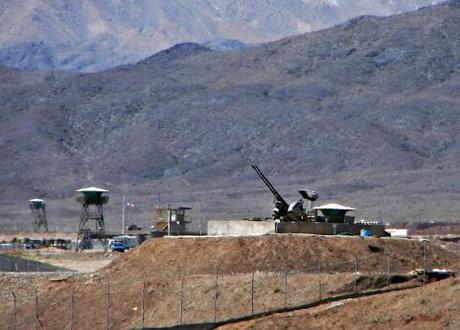
The supposed Natanz nuclear facility in Iran. Photo credit: Hamed Saber
Iran has the capability to make a nuclear weapon, according to the bombshell report from the UN’s nuclear watchdog, the International Atomic Energy Agency, released on Tuesday. The report, which was widely expected to contain evidence of Iran’s suspected nuclear weapons program, claims that Tehran has conducted advanced research on a miniature warhead capable of being carried in medium-range missiles and carried out computer simulations of nuclear detonations. The report stands in direct opposition to Iran’s repeated claims that its nuclear program is peaceful and for civil purposes only and seems to reinforce what the West has long suspected. Iran, for its part, has claimed that the US is behind the report and that the evidence it presents was faked.
Iran still says the West has no proof of nuclear program
The Wall Street Journal characterized the 25-page report as “the loudest alarm yet sounded by the agency in a decade-long standoff with Iran over its nuclear program” and noted that the report comes as some Israeli officials are beating the drums of war and as worries mount over what, if anything, will stop the Iranian nuclear program.
Israel. Israel is staying quiet on the IAEA report for the moment, apparently digesting the information, Israeli newspaper Haaretz reported; this, after days of rumour and speculation that Israeli Prime Minister Binyamin Netanyahu and others were attempting to garner support for a military strike on the Islamic Republic. Government officials nonetheless told the paper that this was the “most damning” report the IAEA has ever published.
Is Israel ready to go to war with Iran?
Intensify sanctions. Tehran “can no longer credibly sustain the fiction that it is engaged in a civil nuclear programme,” The Daily Telegraph declared in a leading editorial following the publication of the report. The IAEA has, in the past, been reluctant to agree with claims that Tehran is building a nuclear weapon; its report now puts pressure on the West to do something about that program, at a time when most Western leaders are preoccupied with economic troubles. “They mustfocus attention on this tinderbox region and seek a new international consensus to intensify the sanctions on Iran,” counseled the paper. “While the threat of military action cannot be ruled out, the next step must be taken through the United Nations – and this time it must be a decisive one.”
Lean on China. Tehran couldn’t have gotten where it is without the help of Chinese companies, which provided the Islamic Republic with the materials that fueled its nuclear progress, Ilan Berman, vice president of the American Foreign Policy Council, claimed in an op-ed for The New York Times. But China has largely gotten a pass in its dealings with Iran, a recent warning from David S. Cohen, the Treasury Department’s new under secretary for terrorism and financial intelligence, notwithstanding. “The result is clear: when it comes to Iran, China today isn’t part of the solution; it’s part of the problem,” Berman wrote. The US must make it clear to China that if it continues to aid and abet Tehran, even while paying lip service to curbing the country’s nuclear program, it will suffer economic consequences.
Council on Foreign Relations decodes the IAEA report:
Action on Tehran not imminent. The West has known for years that Tehran was building a nuclear weapon, despite the Islamic Republic’s repeated protestations to the contrary; the IAEA doesn’t do much to change the situation, said Jonathan Manthorpe, columnist for The Vancouver Sun. Russia and China have already signaled that they will continue to shield Iran from further sanctions from the UN Security Council. The US, mired in Afghanistan and fresh from Iraq, is unlikely to engage Iran militarily, and Israel risks dramatic retaliation from Tehran; moreover, a military strike on Iran’s deeply buried nuclear sites would be unlikely to do more than delay its nuclear program. “So despite the excitements of the last few days, there are still a few years to find ways of countering the threat posed by the current Tehran regime.”
Dodgy intel causing Iranophobia? Pepe Escobar, writing at Asia Times,questioned the veracity of the IAEA’s intelligence, claiming that “the IAEA has no independent means to confirm the enormous mass of information – and disinformation – it receives from mostly Western powers.” Tehran, however, has the power to keep America and Israel guessing, and that’s unnerving. “Predictably, the government of Prime Minister Benjamin Netanyahu in Israel will keep barking to deafening levels, while trying by all ruses necessary to wag the (American) dog,” Escobar said, though likely to no avail – the US isn’t likely to authorize an attack on Iran now. So, what about sanctions? Also not likely – Russia and China have already expressed doubts about the IAEA report. All that talk about isolating Iran, Escobar said, is just “a monumental bluff.”
More on Iran, Israel

